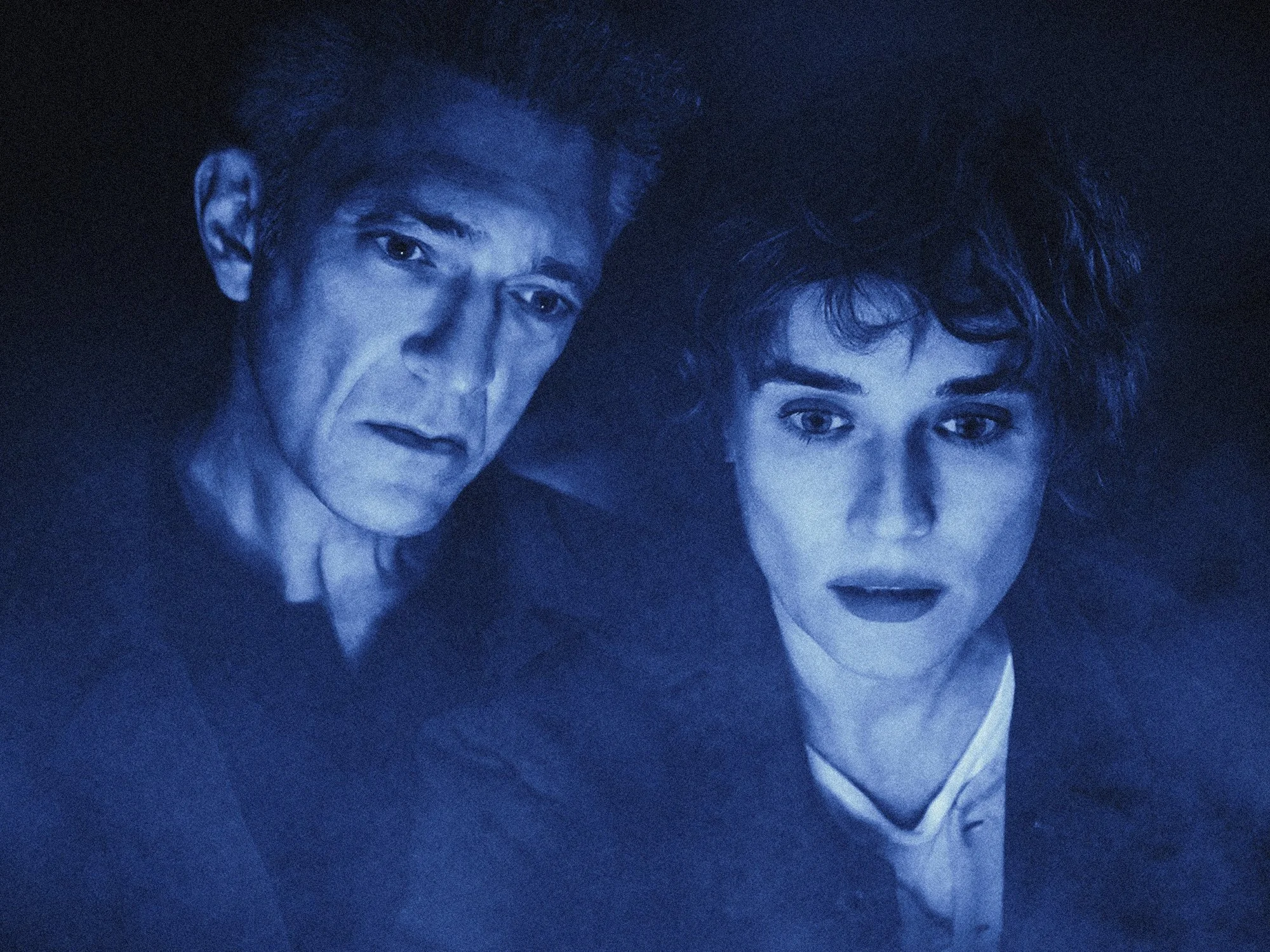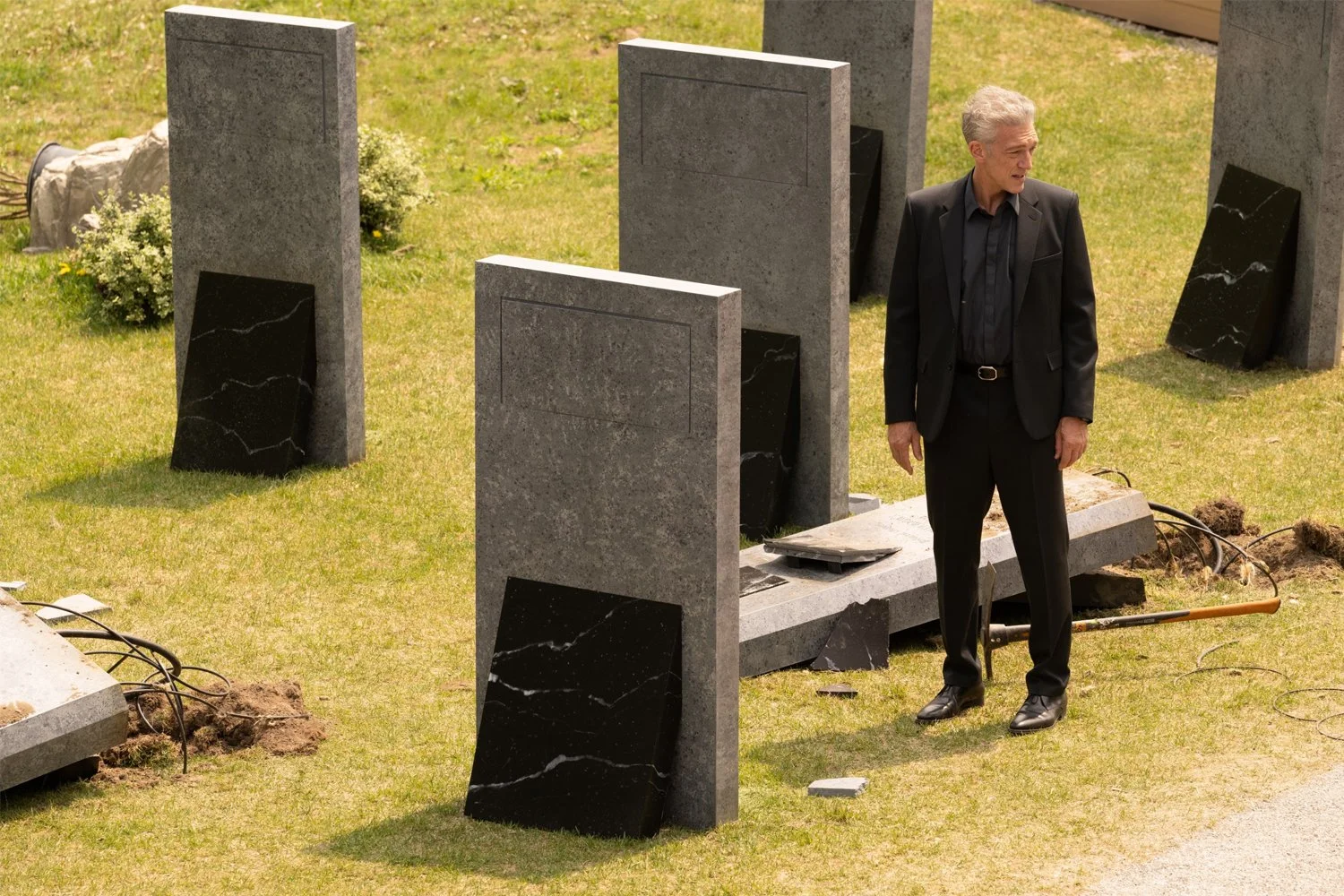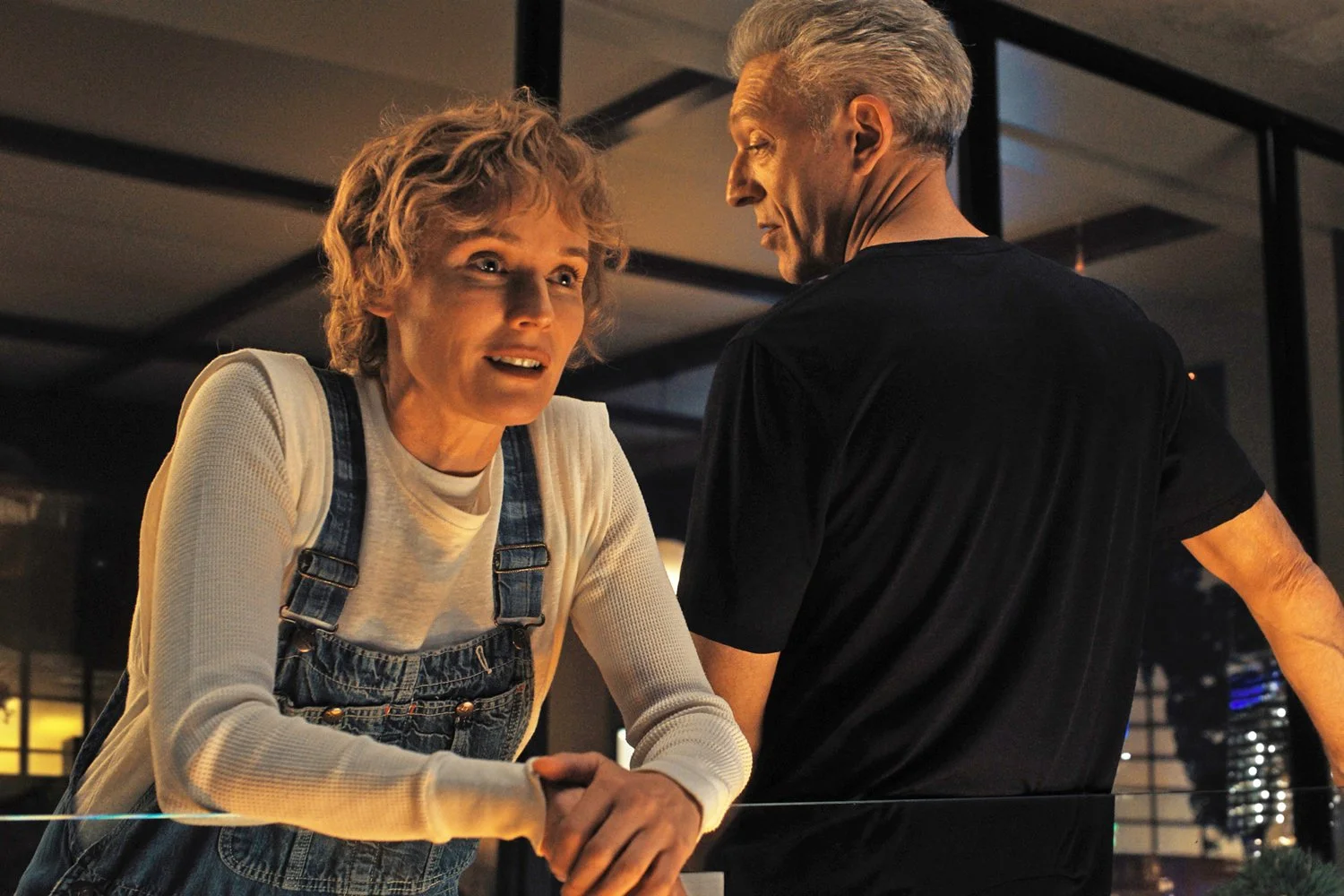NYFF 2024 Film Review: The Shrouds
DAVID CRONENBERG’S GRIEF STORY
David Cronenberg handles his own grief the only he can: through a talky, corpse-voyeur, techno-conspiracy non-thriller. Way ahead of its time, strangely comforting, and wildly funny, The Shrouds extends the legendary filmmaker’s polarizing late oeuvre into deeply personal territory. Minor spoilers ahead…
It’s interesting that in his late style, David Cronenberg is more earnestly than ever engaging with our postmodern, capitalist hellscape while surreptitiously peeling away from the populist aspects of body horror that made him an icon in the first place. 2022’s Crimes of the Future, whose marketing was peppered with the new-fleshy slogan “surgery is the new sex” and the imagery of a freaky-looking “Ear Man,” turned out to be much more demure and thoughtful than its frenzied anticipation demanded: it wasn’t the festival of surgical gore everyone was expecting, instead an “introspective rummaging of [Cronenberg’s] own subconscious and his complex feelings about art and performance in a crumbling world.” Fast-forward two years and inspired by the loss of his wife in 2017, Cronenberg has returned more personal than ever with The Shrouds. And if Crimes of the Future dialed back its broad commercial appeal, then The Shrouds is likely Cronenberg at his most inhospitable — a sterile, cold movie by design that prefers the slow unearthing of its emotional availability.
The mononymous Karsh (Vincent Cassel), sporting cosplay of Cronenberg himself with a minimal wardrobe, sunglasses, and a silver coif, is a self-described futurist and “producer of industrial videos.” Recently, he has funneled his wealth into an ambitious new startup called GraveTech, a private cemetery that houses his latest innovation: the titular “shrouds.” Comprised of sinister-looking sheets of tech fabric that envelops cadavers in fiber-optics, Karsh’s invention allows loved ones — who have the means — to surveil the dead as they decompose in the ground. “It’s pretty definitely a fake,” retorts Karsh when a visitor alludes to the Shroud of Turin. “My shrouds are not fake.” He mentions this because he would know: his dead wife, Becca (Diane Kruger), is in one.
“…The Shrouds is likely Cronenberg at his most inhospitable — a sterile, cold movie by design that prefers the slow unearthing of its emotional availability.”
The Shrouds operates at the liminal intersection of grief and commerce, lust and loss. In a post-screening interview, Cronenberg outlined the feelings most would consider taboo when it comes to the death of a spouse, especially at the hands of a wasting cancer: losing your wife is nothing like losing a parent or sibling — there’s a sexual history there that can’t be ignored, and it’s here that Cronenberg dips back into the tender perversity of his body horror heyday. Karsh, in the evenings, dreams of Becca’s final days as a husk: her form brutally carved into by multiple amputations, a body held together through surgical rivets and scar tissue. His visions of his wife — simultaneously uncanny, erotic, and nightmarish — hint at a series of conjugations Karsh was denied in the waking world. “I lived in Becca’s body. It was the only place I really lived.” It’s one thing for The Shrouds to tackle our irrational and intrusive ids, but this is also Cronenberg we’re talking about. Is this the natural terminus of our screen-abetted dystopia? Will our obsession with capital and stimulus mutate our grief into watching rot through our phones? It’s fitting that The Shrouds’ inciting incident isn’t one of a personal nature, but one of corporate espionage: a group of GraveTech’s executives are sent a cell phone video of their tombs being vandalized, headstones overturned. Does it have to do with a mysterious cabal who question the ethics of the shrouds? Or a Hungarian billionaire who wants to franchise the technology? Convoluting things even further are inexplicable, microscopic growths found on Becca’s corpse, finally made visible by an upgrade to video resolution.
It’s this second development that excites Karsh the most: he sees conspiracies everywhere, and so does Terry (also Diane Kruger), Becca’s dog groomer twin sister. “My money is on tracking devices,” she says, regarding the mysterious growths on Becca’s remains. Raring to jump into any rabbit hole she can, Terry enables Karsh’s investigations, even enlisting her ex-husband, a hacker recluse named Maury (a twitchy Guy Pearce). Not helping matters is that Terry is a dead ringer for her sister, just with — in her words — bigger breasts; the psychosexual tension is so thick you could pluck it out of the air, and the psychic fissures the resemblance furrows on Karsh is palpable . As the trio tries to uncover who exactly is behind the GraveTech break-ins, Karsh is wooed by an enigmatic blind woman who may or may not be associated with the vandals.
“The Shrouds operates at the liminal intersection of grief and commerce, lust and loss.”
At its core, The Shrouds interrogates our rapidly advancing technology as a possible cure for grief. Watching Becca fade into disused flesh and bone six feet under, Karsh tries to convince himself that he’s found one. “It comforts me,” he resigns as the glow of the screen irradiates him. It’s here that Cronenberg draws the line of demarcation between himself and his on-screen avatar: Karsh is locked into his sorrow, and intertwining it with his commercial pursuits has spiraled him into paranoid dead-ends. Cronenberg, behind the lens, is more than eager to muddy the waters as The Shrouds trudges further away from convention. At Cannes, the filmmaker conveyed that “conspiracy theory is a grief strategy,” and as the narrative slips the coils of realism, it becomes increasingly clear that all this detective work is going nowhere — Karsh is trying to recolor his life with all the wrong brushes. He may have extrapolated his intimacy with his wife into an uncharted digital landscape, but it’s almost impossible to innovate his way out of his grief.
Fascinatingly, The Shrouds’ depiction of Karsh as a Cronenberg stand-in isn’t all that charitable: an egotist and an obsessive, he’s the inventor of a macabre technology that — through subtext — we’re clearly meant to disdain. The movie drills right into the core of our warped modernity, where technology transmogrifies everything from our social interactions to even how we grieve. The melding of truth and conspiracy behind a digital mask: that’s the real new flesh. But also leave it to Cronenberg to chip away at the craquelure of a digitally subsumed opportunist such as Karsh to find an inner soulfulness — a human sweetness in looking for our loved ones not only in this world, but also the one beyond.













